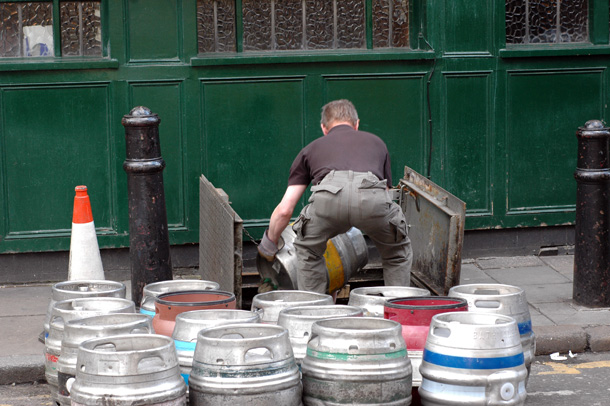BEER AND WINE LINKS 02.26.18
At the end of his mid-week collection of beery links and thoughts Thursday Alan McLeod mentioned “this finite set of stories” that he, Boak & Bailey and I choose from each week. It is one reason I am always excited to see Saturday and Sunday posts, because I get the first chance to comment on them. Conversely, I might delete as story I saved earlier in the week because I expect you to read AGBB and B&B every week and I am already redundant enough.

But some stories deserve to be pointed to time and time again, such as Misogynistic Beer Imagery: Aesthetic, Narratives, Contexts, so we’ll start there. And some kindle a memory. In this case it was casks being delivered at Market Porter in London, which is central to a story about a time when more people visited a pub at the beginning of the day.
So on to the topic of the week. Craft beer is a movement. It is fun. No, it is a business. We need affordable fancy beer for the masses. And cheap beer to pour at tony hair salons. Is that asking too much?
The Forgotten Everyday Origins of ‘Craft’
Apart from its use as a marketing term for, say, microbrews, the word today doesn’t usually connote a skilled trade. … Craft’s magic trick is that it’s play that’s been designed to look like work.”
How Low Can You Go? — Examining Price and Value in Beer.
In 2008, the authors of Trading Up focus on the success of Boston Beer in one chapter, and introducing many small brewery operators to the concept of “new luxury.” They suggested that what set new luxury goods apart from old luxury ones – those based on status, class and exclusivity – is they sell at higher prices and in much higher volume. “The demand is highly elastic because it can be created in categories that have never had a premium offering before,” they wrote. Time to reconsider price elasticity?
Which is why it makes sense that more breweries explore the thresholds of what can be afforded by them as well as what can be afforded by their consumers. By showing a willingness to make margins tighter, breweries are expanding their potential reach.”
Beer’s biggest growth channel? The ubiquitous dollar store.
Dollar General, which posted sales of $22 billion in its fiscal 2016, now boasts 14,321 retail locations in 44 states, a 35 percent increase from five years ago. Some 8,200 of them sell beer. Today, more than three in four Americans live within five miles of a Dollar General store.”
Community pub owner criticises craft beer for ‘pricing out’ poorer consumers.
If the £5 pint becomes the standard for craft beer, then that will be it for craft beer as far as our community is concerned because they don’t have the money for it.”
How humble Hamm’s beer became cool.
At Honeycomb, the exceedingly stylish south Minneapolis salon where Saladin gets his hair cut, you’re handed a Hamm’s if you prefer beer to coffee or water.”
Craft beer isn’t beer for the people, it is beer for some people – people with a few bob – so shouldn’t those making it and selling it should be honest enough to say so? After all, not so deep down, we all know that already.
I think the main conclusion of the beer debate was just that. There is beer for everyone, but not everyone can have some beers. Some beer will always be a treat. We should just accept that.”
MORE BEER; JUST THE LINKS
– One Other Problem With The Young White Males…
– Charabanc Fever.
– Tom Peters: The Belgian Beer Whisperer of Philadelphia.
– Golden Road and the Abyss Ahead.
WINE
Kermit Lynch’s Adventures on the Wine Route Is Still Forging Tastes, 30 Years Later.
This story reminded me “Adventures” is worth re-reading, so I pulled it off a shelf and put it on the nightstand. Pardon me if I am dreaming of wine this week.
Lynch’s track record is astonishing. It’s as if a single A&R man had discovered the Beatles, the Stones, the Kinks, the Who, and Pink Floyd. Others followed his path, but it’s doubtful any had the same impact on American wine drinkers, or on European winemakers, whom Lynch encouraged to follow traditional practices.
FROM TWITTER
How about that for fresh train beer? Canned on Friday in New York, drunk in Kent on Wednesday evening. pic.twitter.com/DbQSlmqxUI
— PeteBrissenden (@PeteBrissenden) February 21, 2018